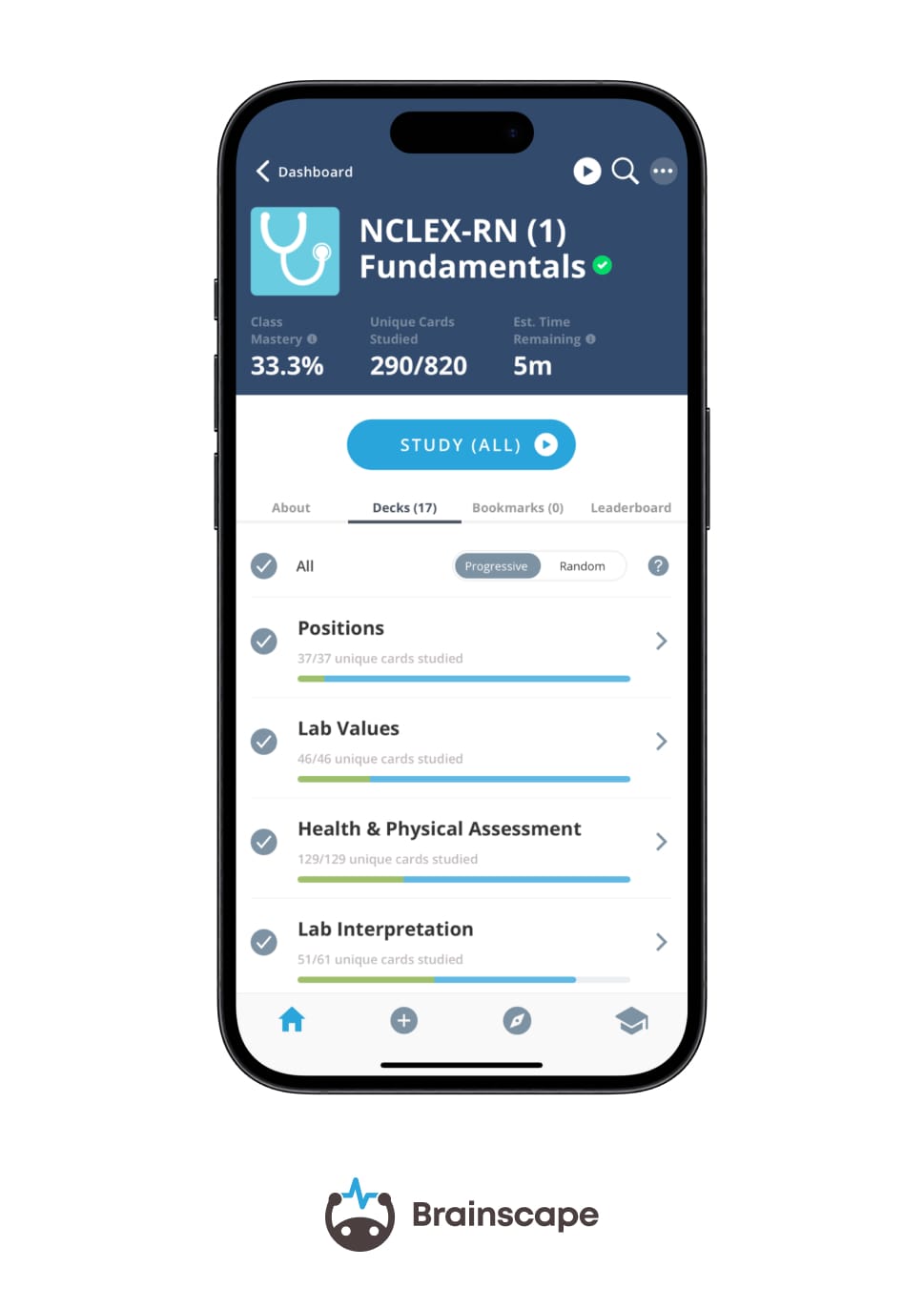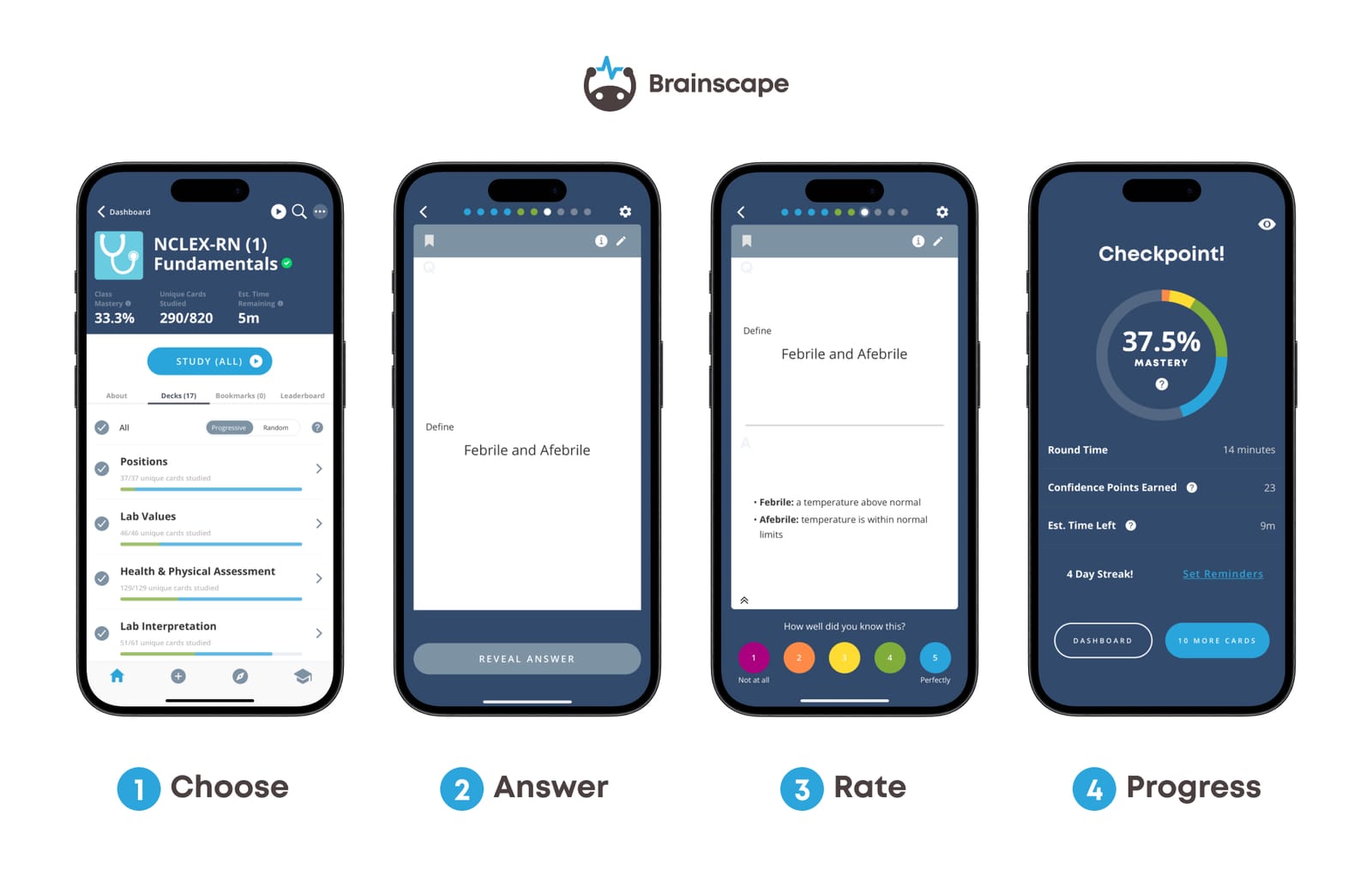The NCLEX is the final obstacle between nursing grads and a healthcare career. It’s kinda like the “big bad boss” at the end of the video game. The only thing is, if you fail the NCLEX, starting over isn’t quite as easy as restarting your video game.
So, our goal with this guide is to equip you for success with the five keys (and top resources) to pass the NCLEX the first time around!
Key To Passing The NCLEX # 1: Know The Nursing Content Well
Knowing the nursing content well might sound obvious. Still, you’d be AMAZED by how many nursing students seem to think that the key to passing the NCLEX nursing exam lies in perfecting their critical thinking and reasoning skills and not in their content knowledge.
Does the NCLEX test critical thinking? Yes, but you need to know the nursing content well to pass. Would you want a nurse tending you if they didn’t know their pharmacology facts? This exam ensures you’re prepared and knowledgeable for the clinical environment.
Four Tips For Knowing The Nursing Content Well:
- Use digital flashcard apps like Anki or Brainscape to drill yourself (learn and memorize) on the most commonly tested concepts way more efficiently than if you just relied on your textbook and study notes. Digital flashcards automate the timing at which you return to a concept and are proven to improve scores on medical exams. Also, because they live in your phone, you can study anytime, anywhere!

- Design a daily study schedule that portions out the time you have before the NCLEX, making sure that you can cover everything in time, with plenty of time for frequent review of older concepts and practice questions.
- Frequently review the previously studied content, so you don’t forget anything as you progress. Brainscape makes this easy for you by automating the repetition of older concepts according to what you’re confident in and aren’t.
Key To Passing The NCLEX # 2: Practice Plenty Of NCLEX-Style Questions
Practicing NCLEX-style tests and questions is how you will work on and polish the critical thinking and reasoning skills essential for passing this final licensing exam. You can know the content back-to-front, but if you don’t learn how to answer NCLEX-style questions—designed to prepare you for the real challenges of the clinical healthcare environment—you could fail.
These questions test your ability to apply nursing knowledge to real-world scenarios. This means learning to identify which details are relevant while avoiding absolutes.
Critical thinking is a skill and, like all skills, if you want to get good at it, you need to practice, practice, practice!
Four Tips For Practicing NCLEX-Style Questions:
- For every topic (Management of Care, Maternity, Adult Health, etc.), practice at least 100 NCLEX-style questions before you take the exam.
- Spend as much time scrutinizing your results as you took answering the questions in the first place. Here is where real learning happens, and it’s going to prevent you from making the same mistakes over and over again.
- Use an app like Anki or Brainscape to create flashcards for the concepts you struggle with. You can then use these to drill yourself on your knowledge weaknesses in your spare time, eventually turning them into strengths!
Key To Passing The NCLEX # 3: Work According To A Study Plan
The students who perform the best on the NCLEX keep things organized and monitor their progress. So, before you embark upon your prep, dedicate a few days to laying out all the content you need to study, review, and practice in the coming weeks or months ahead of your exam.
On this subject, Brainscape has created these totally free NCLEX study planners and exam countdown sheets just for you, which you can customize however you want to stay hyper-focused and on track to crush your study goals!
This grand study plan will essentially become a road map that guides you from where you are now to becoming an NCLEX-question assassin who knows the content exceptionally well and can think critically on the spot!
Four Tips For Creating An NCLEX Study Plan:
- Choose a study planner that you like and customize it according to how much time you have left until your exam, etc.
- Keep your daily study tasks and media varied, so you don’t get bored. In other words: include a mix of a textbook, note-making, flashcards, video lectures, and practice questions daily, dedicating 20 minutes to an hour to each task.
- Include some group study sessions and well-timed breaks to keep you motivated, accountable, and on track.
Key To Passing The NCLEX # 4: Manage Your Stress

It happens to most students: exam stress.
The NCLEX tests an enormous body of knowledge. It’s also the gateway you need to pass through before you can get a job as a nurse, so there’s a lot on the line. Being prepared by knowing your nursing content (key # 1), having practiced lots of NCLEX-style questions (key # 2), and having a well-thought-out study plan (key # 3) is guaranteed to make you feel better and more confident.
However, many students (if not most) STILL feel anxious when going into the NCLEX, with the biggest fear being that they’ll just “go blank” on the day. If you genuinely are prepared, the best way to combat anxiety will be more psychological: having a coping mechanism that calms your mind and keeps you focused on the test day.
Four Tips For Dealing With NCLEX Stress:
- Make time for self-care and social connection. Don’t just shut yourself into your room for weeks at a time while you study. It’s essential to fill that love tank and blow off a little steam.
- Exercise is a super helpful tool for stress management. It takes all that nervous energy generated by the stress hormones your brain is pumping into your body and channels it into physical exertion. It makes you stronger, helps you sleep better, releases endorphins, and completes the cycle of stress, helping you feel much better mentally.
- Before test day, figure out where the testing center is and how long it should take you to get there (even in traffic conditions), with at least 30 minutes extra to account for unforeseen delays. The last thing you want is to get lost or delayed on the way to the exam venue, which causes stress.
Key To Passing The NCLEX # 5: Don’t Ever Be Afraid To Ask For Help
If you find yourself struggling for any reason—academically, mentally, or physically—don’t be afraid to ask for help. The longer you leave a problem, the worse it’ll get. Even if you don’t have a great support system at home, there are people at your educational institution who care about your success and can guide you, even if your problem isn’t academic.
Five Tips For Seeking Help In Nursing School And Your NCLEX Prep
Approach your professor or instructor after class or via email, explaining your difficulties and asking for help with any concepts you may be struggling with.
- Ask your school if they have any additional resources or provide additional support for struggling students. Most of them will be happy to help you figure things out!
- Create a study group to hold each other accountable and keep each other up to speed.
- Talk to your fellow students. They are very likely going through the same thing as you. And if not, they are still empathetic human beings!
- Finally, if you can afford it, seek outside help like an NCLEX tutor. You could even gather a group of struggling students and suggest that you all chip in for group lessons.
The bottom line is that help is available to you, and there’s absolutely NO shame in asking for it. But lean first on your school. That’s what you’re paying them for, after all!
TL;DR: The 5 Keys To Pass The NCLEX

- Key # 1: Know the nursing content well
- Key # 2: Practice plenty of NCLEX-style questions
- Key # 3: Work according to a detailed study plan
- Key # 4: Manage your stress (because being anxious is perfectly normal)
- Key # 5: Don’t ever be afraid to ask for help if you need it
Remember that you're never alone as a nurse, even during training. You can reach out to your peers and teachers, or seek support from larger institutions like the American Nurses Association, which provides support specifically for nursing students. Study hard, and keep your chin up: YOU’VE GOT THIS, and we wish you all the best on your exam!
Additional Reading
- How to study for the NCLEX more efficiently
- How to banish your stress with an NCLEX study plan (and other advice)
- How long should I take to study for the NCLEX?
References
About student nurses. ANA. (2017, October 14). https://www.nursingworld.org/membership/student-nurses/
Childs, E., & de Wit, H. (2014). Regular exercise is associated with emotional resilience to acute stress in healthy adults. Frontiers in Physiology, 5. https://doi.org/10.3389/fphys.2014.00161
Deng, F., Gluckstein, J. A., & Larsen, D. P. (2015). Student-directed retrieval practice is a predictor of medical licensing examination performance. Perspectives on Medical Education, 4(6), 308–313. https://doi.org/10.1007/s40037-015-0220-x
Top NCLEX practice questions you should study. Nurse.org. (n.d.-b). https://nurse.org/education/nclex-practice-questions/
